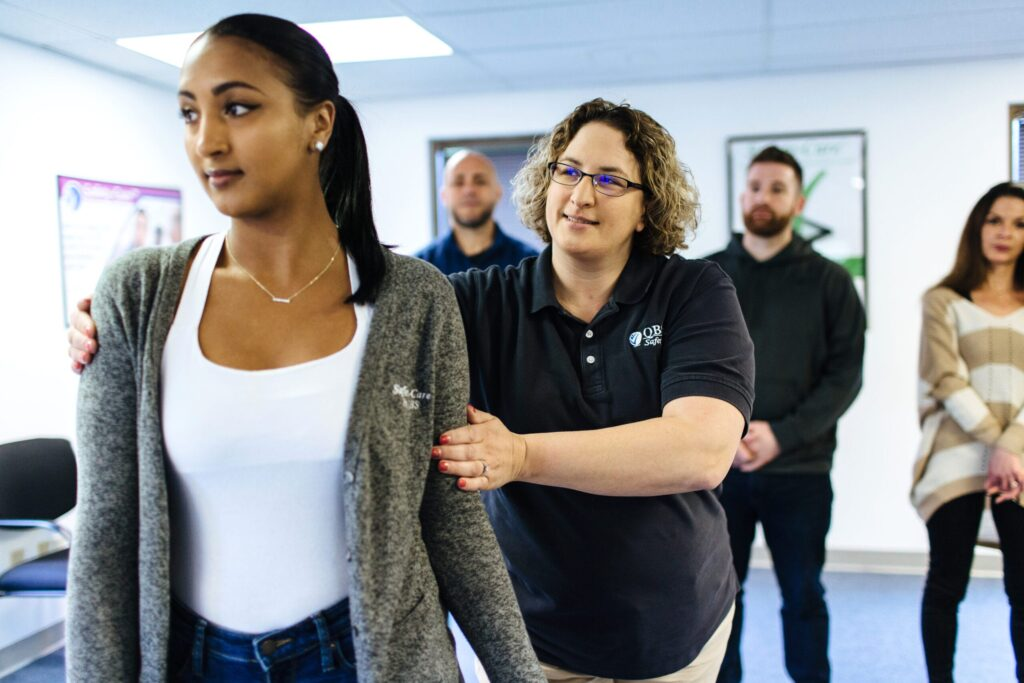West Virgina DOE Policy 4373 – Expected Behavior in Safe and Supportive Schools
In 2012 the West Virginia Department of Education adopted new rules (Policy 4373) that establish guidelines for “expected behavior in safe and supportive schools”. Regarding the use of restraint, training must now be provided to staff, volunteers, or contractors that may be expected to use physical restraint.

.png?width=88&height=95&name=Group%20137%20(5).png)


How to Implement Safety-Care?
-
Register for a Safety-Care Trainer class or call us to request a closed session for your organization. We regularly conduct classes in all 50 states and Canada.
-
Complete your class to become a certified Safety-Care Trainer for your organization. We bring you to fluency using an errorless teaching methodology.
-
You train and certify your staff in Safety-Care’s effective techniques.
-
Our Master Trainers are available by phone, email, or video to help your organization with any questions or concerns while using or implementing Safety-Care.

Legal Requirements
|
Summary and Safety-Care Alignment: Effective: July 1, 2012 Last Updated: December, 2024 In 2012 the West Virginia Department of Education adopted new rules (Policy 4373) that establish guidelines for “expected behavior in safe and supportive schools”. Regarding the use of restraint, training must now be provided to staff, volunteers, or contractors that may be expected to use physical restraint. This training must be provided on an annual basis, have a core team of trained personnel at each school, including an administrator or designee, and a special education staff member. The training must include methods of prevention and de-escalation techniques, as well as positive behavior intervention and supports (PBIS). How Safety-Care aligns: Numerous organizations throughout the United States and Canada rely upon QBS and our Safety-Care training to provide their staff members with the training they need to help maintain a safe and healthy environment. Safety-Care provides a comprehensive, supportive approach to incident prevention, de-escalation, and management. Your Staff will learn practical strategies for helping students that use evidence-based practices consistent with PBIS (Positive Behavior Interventions and Supports) and ABA (Applied Behavior Analysis). |
Why Safety-Care?
Benefits & Differentiators
In addition to Safety-Care being highly cost-effective, you get:

Skills to effectively prevent, minimize, & manage behavioral challenges with dignity, safety, & the possibility of change

Decreases in staff and patient injuries and reduction in restraint & seclusion time

Instructional procedures based on decades of evidence-based research & compatible with ABA, PBIS & reinforcement-based environments

Customizable program for your setting, staff & clientele, with a strong focus on preventative via non-intrusive, replacement behaviors

Extremely rigorous standards grounded in errorless teaching methodology

Small, intimate class sizes backed by unlimited support & resources
How Is Safety-Care So Effective?
A Genuine Focus on Implementing & Managing Positive Behavioral Skills
Proactive, environmental management recommendations
Understanding of evocative effects of staff behavior
In-depth analysis of antecedents and proactive antecedent interventions
Evidence-based reinforcement procedures
Required competency in de-escalation skills
Humane, non-invasive touch and QBS Check™ strategies
Evidence-based teaching procedures
Applicable to a wide array of settings, conditions & challenging behavior





